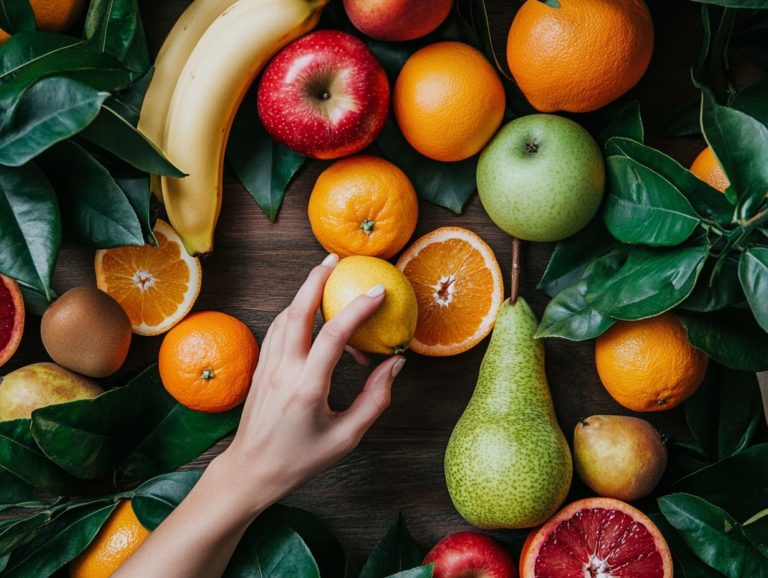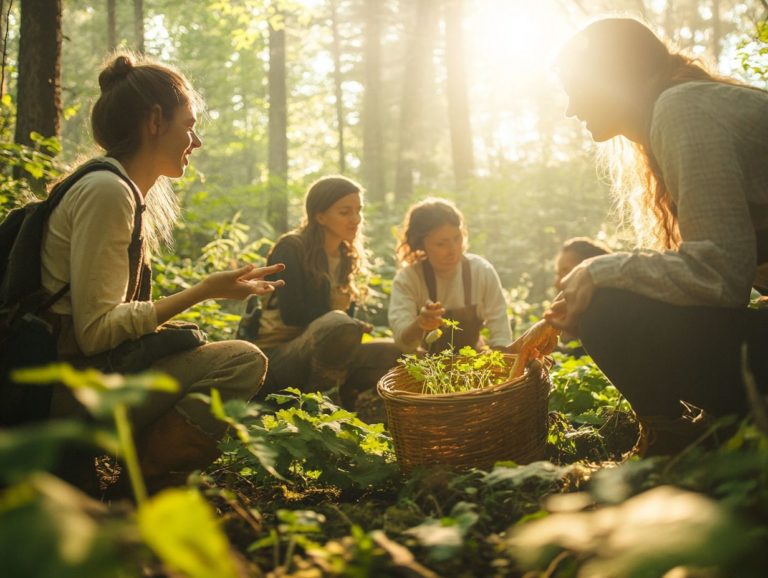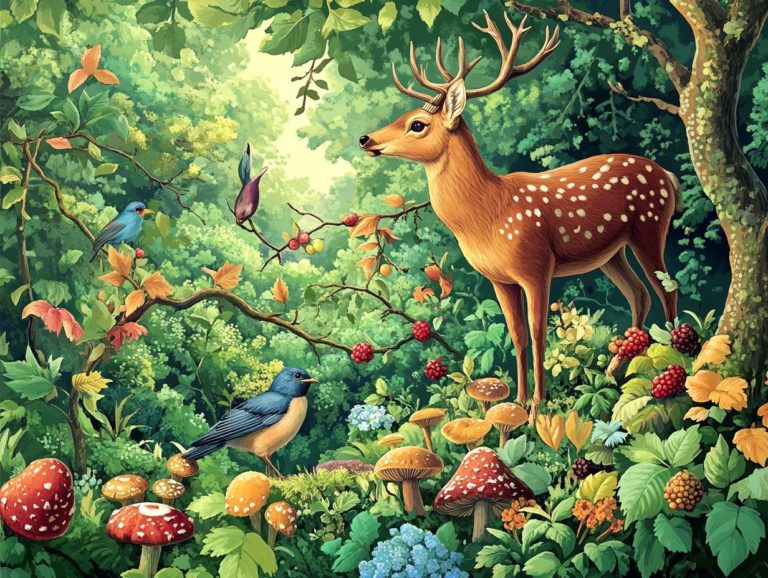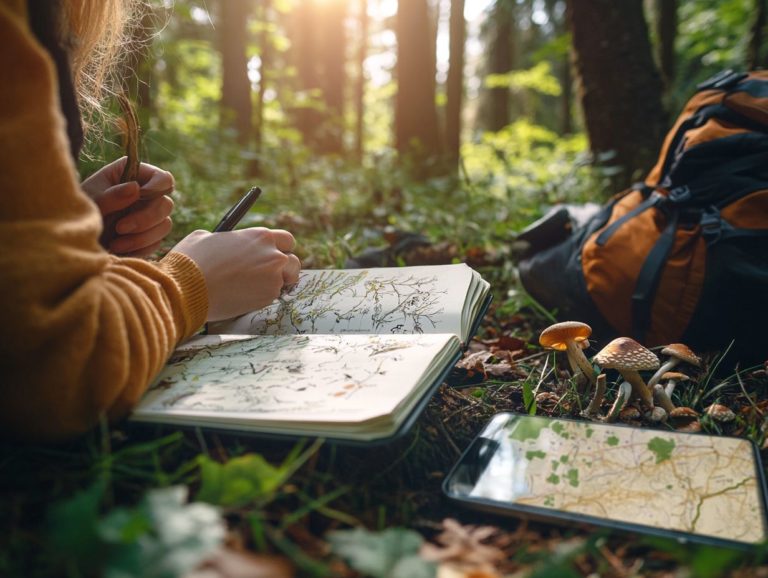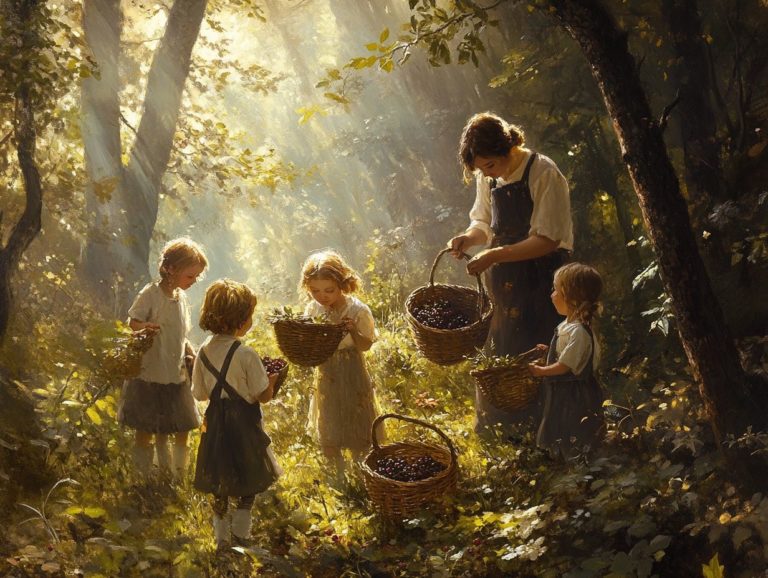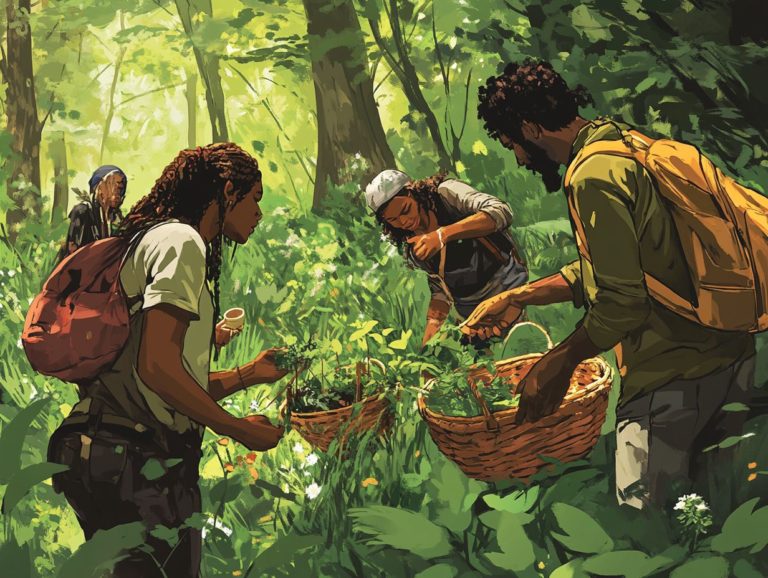How to Research Local Foraging Regulations?
Foraging for wild edibles can be a truly rewarding and delicious way to connect with nature. However, it’s crucial to stay informed about local regulations. Knowing these foraging rules not only ensures your safety but also protects the delicate balance of natural ecosystems.
This article will guide you through the nuances of local foraging regulations, emphasizing their importance and helping you find reliable information. You ll also learn how to interpret and comply with these essential rules and discover the potential consequences of overlooking them.
Dive into responsible foraging practices that allow you to savor nature’s bounty while honoring the environment, including sustainable techniques.
Contents
- Key Takeaways:
- Understanding Local Foraging Regulations
- Why Research Local Foraging Regulations?
- Where to Find Local Foraging Regulations
- Interpreting Local Foraging Regulations
- Tips for Complying with Local Foraging Regulations
- Why Following Foraging Rules Matters: Protect Your Local Environment and Avoid Legal Trouble!
- Frequently Asked Questions
- What are local foraging regulations?
- Why is it important to research local foraging regulations?
- How can I research local foraging regulations?
- What should I look for when researching local foraging regulations?
- Can local foraging regulations vary from place to place?
- Are there any resources available to help me understand local foraging regulations?
Key Takeaways:

- Know what local foraging regulations are to avoid confusion and promote care for the environment.
- Research these rules to ensure your foraging is responsible and legal.
- Online sources and government agencies, including herbalism courses and local foragers, are trustworthy for finding and interpreting local foraging regulations.
Understanding Local Foraging Regulations
Understanding local foraging regulations is essential for anyone eager to explore the world of wild plants. For more information, check out the best local resources for foraging safety. These guidelines promote safe foraging practices and ensure that you respect local native environments.
Regulations can vary significantly, shaped by factors like environmental impact, species protection, and sustainable practices; all vital for preserving native habitats. Familiarizing yourself with these regulations and ethical foraging methods, such as plant identification, can enrich your outdoor adventures and create meaningful connections with both plants and your community.
What are Local Foraging Regulations?
Local foraging regulations are established by governing bodies to manage the harvesting of wild plants. They ensure sustainable practices and safeguard native species from over-exploitation, especially in the context of climate change.
These regulations can vary significantly between regions, outlining specific guidelines that determine which plants you can legally harvest. For instance, some areas may restrict foraging to non-endangered species, while others might designate protected zones, like National Parks, where harvesting is off-limits. Generally, there are limits on quantities to prevent disruptions in local ecosystems and support sustainable foraging.
Knowing these rules is vital for your safety! It also promotes food safety, as certain wild plants can be toxic if misidentified, highlighting the importance of proper identification. Conservation efforts intertwined with these regulations play a crucial role in maintaining ecological balance and fostering biodiversity and sustainable harvesting practices that benefit future generations.
Why Research Local Foraging Regulations?
Researching local foraging regulations is crucial if you’re looking to engage in ethical foraging, particularly in urban scenarios. This knowledge helps you grasp your responsibilities regarding environmental care and enriches your wild food adventures. For more information, check out the best resources for local foraging in your area’s stunning natural landscapes.
By staying informed, you can truly enjoy your foraging experiences while respecting the ecosystem around you, enhancing your connection to nature. Start exploring today while respecting our beautiful ecosystems!
Importance of Knowing Regulations
Understanding rules for gathering wild food is essential for ensuring you can forage safely while supporting food justice, community involvement, and sustainable practices within your community.
By familiarizing yourself with these regulations, you can avoid costly fines and potential legal issues. This creates a safer environment for everyone in the foraging community.
Responsible harvesting not only protects local flora and fauna but also enhances the integrity of ecosystems. It allows natural habitats to flourish through sustainable foraging practices.
When communities prioritize adherence to these guidelines, they often witness a resurgence of biodiversity. This is evident in several regions where local laws have effectively curtailed overharvesting, reinforcing the importance of plant conservation. These instances highlight that when individuals collaborate with local authorities, conservation groups, and local herbalists, the outcome can benefit both the environment and the well-being of the community.
Where to Find Local Foraging Regulations

Finding local foraging rules is easy and exciting! Here s how you can start.
You can tap into a variety of resources, including local foragers and environmental organizations.
Government agencies, community organizations, and specialized online platforms like Falling Fruit and the Herbal Academy, which focus on foraging and wild plants, are all invaluable tools at your disposal.
Numerous online resources offer invaluable insights into local foraging regulations. Websites, forums, and digital herbal guidebooks, including those from John Kallas and Darcy Williamson, can greatly assist you in plant identification and safe foraging practices.
Organizations such as the USDA Forest Service and state wildlife agencies provide the latest information on foraging laws. Conservation groups like the Wild Food Trust and the Foraging Community offer essential guidance on what to know about seasonal foraging in your area, supporting community involvement and promoting ethical and sustainable practices when foraging local flora.
Educational platforms, including YouTube and various foraging blogs, feature experienced foragers and local herbalists sharing their wisdom on the laws specific to your region.
Stay informed and verify details before you head out! Regulations change frequently, and knowing the rules keeps you safe and responsible. This diligence ensures that you engage in responsible practices, safeguarding both the environment and your own well-being, especially when foraging in urban areas.
Government Agencies and Organizations
Government agencies play a vital role in shaping and enforcing local foraging regulations. They ensure that your foraging practices have minimal environmental impact, support food justice, and are sustainable for generations to come.
Local parks departments and environmental protection organizations create the guidelines for safe foraging. They are crucial in spreading awareness about these practices.
By hosting workshops on herbalism, distributing educational materials, and creating easily accessible online platforms, they engage you with crucial information about the flora and fauna in your area, enriching your plant knowledge.
Collaborating with local experts and advocates, they develop programs that promote ethical foraging, cultivating a sense of stewardship among community members that ultimately benefits both local biodiversity and cherished foraging traditions, especially in urban foraging environments.
Interpreting Local Foraging Regulations
Interpreting local foraging regulations requires your careful attention to the specific rules and guidelines established in your area. This includes understanding common restrictions and permissions concerning the harvesting of wild plants, particularly during climate emergencies, such as events like droughts or floods that can impact local ecosystems.
By doing so, you can ensure that your foraging practices remain both lawful and sustainable, promoting ecological awareness.
Common Restrictions and Permissions
Common restrictions in local foraging regulations might include limitations on the types of wild plants you can harvest, the quantity permitted, and the specific locations where foraging is allowed, such as designated parks or natural reserves.
These measures are designed to ensure food safety and promote ecological awareness, which is crucial for responsible food harvesting.
For instance, in many areas, harvesting endangered plant species is illegal. Protecting these varieties is essential for maintaining biodiversity and supporting plant conservation efforts.
Local laws often dictate that you can only collect a limited number of plants from each location. This helps prevent overharvesting and allows ecosystems to recover, safeguarding our natural resources.
You may need to forage only within designated parks or natural reserves, including spots like Joshua Tree National Park and C&O Canal National Park, which serve as protected areas for wildlife and vegetation.
Following these regulations is crucial not just for your safety but also for long-term sustainability and the preservation of native flora. By adhering to these guidelines, you help ensure that future generations can enjoy and benefit from the natural resources available, enhancing their connection to the environment.
Tips for Complying with Local Foraging Regulations

Complying with local foraging regulations requires you to grasp the best practices for responsible foraging, including understanding the wildcrafting process. This knowledge not only enriches your wild food adventures but also prioritizes your safety in the outdoors and supports keeping the environment healthy through community engagement.
Best Practices for Foraging Responsibly
Adopting best practices for responsible foraging requires a keen understanding of harvesting ethics, respect for plant relationships, and a commitment to a sustainable approach to wild plant collection. Local herbalists can provide valuable guidance.
Be mindful of the environment by practicing the principles of Leave No Trace. Treading lightly and avoiding damage to delicate ecosystems is essential, especially during outdoor exploration.
Only harvesting what is necessary helps maintain the balance of local flora, ensuring that plants can continue to thrive for future generations, thus supporting food harvesting practices.
Many sustainable foraging communities stress the importance of proper plant identification. This prevents the accidental harvesting of rare or endangered species, particularly during climate emergencies.
Engaging with local herbalists offers invaluable insights into regional plants. They often share knowledge about their uses while promoting conservation efforts and herbal remedies.
By collaborating within these communities, you can cultivate a deeper appreciation for the natural world and its abundant resources, enhancing your overall foraging experience.
Why Following Foraging Rules Matters: Protect Your Local Environment and Avoid Legal Trouble!
Neglecting local foraging regulations can lead to serious repercussions, including hefty fines, legal repercussions, and detrimental environmental effects. These consequences could threaten local ecosystems and hinder plant conservation initiatives.
It’s essential to adhere to these guidelines to protect both the natural world and your own interests! Ignoring these rules can lead to serious fines and damage to our precious ecosystems. Protect our environment follow the guidelines!
Explore responsibly! Join the movement for sustainable foraging and get involved in local foraging communities.
Possible Fines or Legal Action
Possible fines or legal actions could arise from violations of foraging regulations. This highlights the importance of community engagement in fostering understanding and adherence to these guidelines.
These legal repercussions might include fines that can vary significantly based on the severity of the offense and the specific regulations at play. Repeat offenders could face even graver consequences, such as misdemeanor charges or supervised probation.
By promoting community awareness initiatives, local organizations can educate residents about safe foraging methods and the critical need for compliance with these laws. Workshops and informational campaigns can clarify what is legally permissible, encouraging responsible harvesting and safeguarding vulnerable ecosystems.
Your combined efforts can create a powerful respect for nature that makes a real difference! This can effectively mitigate potential violations.
Frequently Asked Questions
What are local foraging regulations?
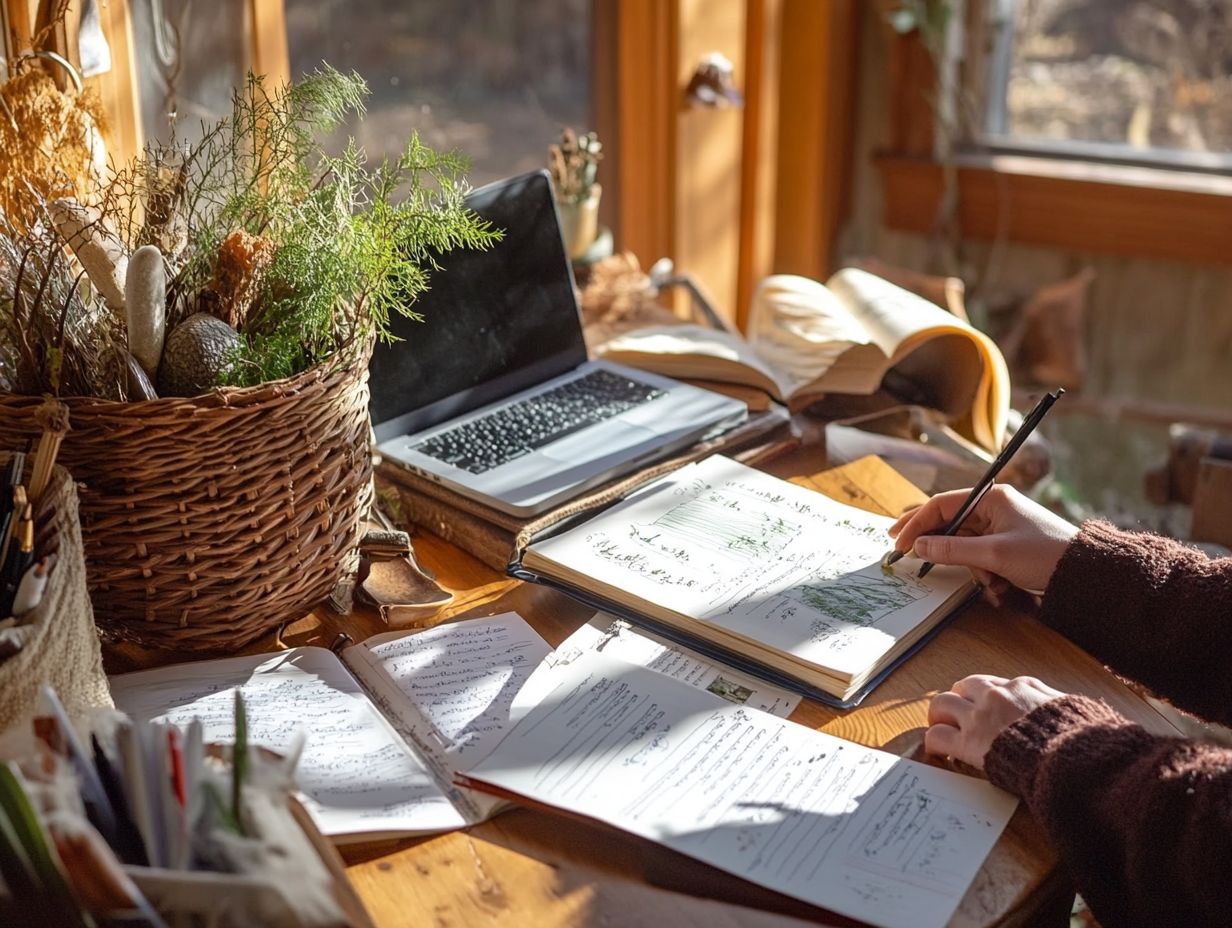
Local foraging regulations refer to rules and laws that govern the collection of wild plants, mushrooms, and other natural resources for personal consumption or commercial purposes.
Why is it important to research local foraging regulations?
Researching the legalities of foraging ensures compliance with the law and helps avoid fines or legal consequences. Understanding these regulations protects the environment and promotes sustainable foraging practices.
How can I research local foraging regulations?
You can research local foraging regulations by visiting your state or county’s government website, contacting local foraging organizations, or consulting with a knowledgeable forager in your area. For more detailed information, check out understanding local foraging laws and regulations.
What should I look for when researching local foraging regulations?
When researching local foraging regulations, look for information on what plants and mushrooms are permitted for collection, any restrictions on where and when you can forage, and what local foraging permits are required.
Can local foraging regulations vary from place to place?
Yes, local foraging regulations can vary from place to place. It’s important to research the specific regulations for the area you plan to forage in, as they may differ from neighboring regions. For more guidance, check out resources that can help with foraging.
Are there any resources available to help me understand local foraging regulations?
Yes, resources are available to help you understand local foraging regulations. You can consult with local foraging organizations, attend workshops or classes on foraging laws, and read books or articles on the subject.
Join local foraging workshops or campaigns to deepen your understanding and engage with your community!

